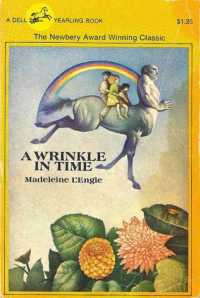
A Wrinkle in Time
by Madelene L’Engle
Farrar, Straus, and Giroux, 2010
(Originally published in 1962)
[Challenge # 3: A book you loved as a child.]
Like many children of a certain generation, I read Madeleine L’Engle’s classic SF novel A Wrinkle in Time in fifth or sixth grade and fell in love with it. It had been left at my house, I think, by my foster sister who was then attending summer camp. The freaky centaur-being on the cover intrigued me and I started to read. I don’t know if I ever re-read it as a child (she may have taken the book back when she returned) but I do know I had extremely fond memories of it. Since one of these book challenges was to re-read an old childhood favorite, I picked this one over another favorite, The Jungle Books, because I did want to see how well it held it up in comparison to the newer YA books I’ve been reading, which I haven’t found much to sing praise about.
Wrinkle has held up well, even though it was written in the late 1950s and lacks many cultural givens of the 2010s. Eerily so, in fact: the cultural touchstones that could have been in there, like gathering around a B&W TV set to watch variety shows, were not, and this had the effect of setting the book in a kind of timeless limbo. Only the details gave the era away, like the local “tramp” stealing sheets off a clothesline. I was able to skim these over, but acknowledge that a junior high student of 2017 might find less to relate to. But overall, the book stands head shoulders above 95% of current YA and I also gained a new admiration for it. L’Engle was a wonderfully sensorial writer, whether she was describing walking through the woods in Autumn or the feeling of being squished in a two-dimensional world, and Meg remains as “real” and sympathetic as she was back in the 1970s when I first read her.
For those who don’t know the plot, 12-year-old Meg lives with her scientist mother and three brothers in a farmhouse/laboratory on the edge of some small New England town. Their father, also a scientist, has disappeared working on some secret project for the government. The townspeople gossip that he’s run off with another woman, causing Meg distress; also causing her distress is the dull, stifling public school she goes to, and her current unattractiveness (she has frizzy hair, glasses, and braces.) One “dark and stormy night” three odd, elderly women turn up, Mrs. Watsit, Mrs. Who, and Mrs. Which, who turn out to be angels of a sort who whisk Meg, her younger genius brother Charles Wallace, and friend Calvin to another world where they are tasked to rescue their father from a monstrous evil.
It was actually a quick read, being around 70K words I estimate, but it felt much longer, in an enjoyable way, because there was so much to digest and literally no wasted words. A lot of the plot and characterization was carried through dialogue, something I’d forgotten from the first read, and boy was that masterfully done, feeding you bits and pieces as you progressed rather than in huge info dumps. There was just enough weirdness to intrigue rather than repulse, and though it was a children’s book, the author did not pull punches in her depictions of events. Meg does not become magically beautiful at the end of the story; her reunion with her father is also not a wholly happy one. This wasn’t a moralistic tale, but a theologic one.
And there was theologic weirdness aplenty: the witch’s true angelic forms are those of giant-sized male centaurs with wings instead of arms (who sing hymns) and an evil cloud-thing that enfolds planets like a dark nebula. This is mixed up with a love of and respect for science: the witches “tesser” through space, folding it to travel between two points, and there’s a bureaucratic totalitarian planet ruled by a giant brain. The humanities are also stressed, Mrs. Who quoting notable philosophers and playwrights to get her points across.
What I’d forgotten about the book was how much of a little shit Charles Wallace was, a combination of the Boy Genius, Idiot Savant, and Horror Child tropes. In fact, I am sad to say I relished the later parts of the story where he gets involved in fisticuffs with Meg and Calvin and gets smacked around (I don’t think any modern YA author would write this.) The kid was insufferable and completely unlike any 6-year-old, genius or not, that I’ve ever met. I want to say the author had never met a real, living, breathing child that age, but apparently she had a son of her own on whom CW was based, and perhaps attributed to him more wisdom than he had. As an adult this makes sense, since Meg’s devotion to him — even as he condescends and speaks down to her — is like that of a mother who sees no faults, rather than an older sister mothering a younger sibling.
I still give it five stars, even though I find it now easier to admire than love.











